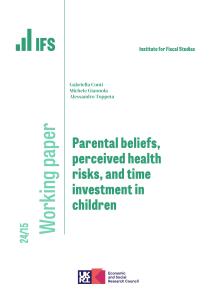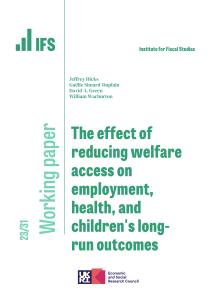This paper examines the long-term impacts on health and healthy behaviors of two of the oldest and most widely cited U.S. early childhood interventions evaluated by the method of randomization with long-term follow-up: the Perry Preschool Project (PPP) and the Carolina Abecedarian Project (ABC). There are pronounced gender effects strongly favoring boys, although there are also effects for girls. Dynamic mediation analyses show a significant role played by improved childhood traits, above and beyond the effects of experimentally enhanced adult socioeconomic status. These results show the potential of early life interventions for promoting health.
Authors

Research Associate University of Chicago
James is a Research Associate of the IFS and the Henry Schultz Distinguished Service Professor of Economics at the University of Chicago.

Research Fellow University College London
Gabriella is a Research Fellow of the IFS and a Professor of Economics in the Department of Economics and in the Department of Social Science at UCL.

Rodrigo Pinto
Working Paper details
- DOI
- 10.3386/w21454
- Publisher
- NBER
Suggested citation
G, Conti and J, Heckman and R, Pinto. (2015). The effects of two influential early childhood interventions on health and healthy behaviours. Cambrifge, MA: NBER. Available at: https://ifs.org.uk/publications/effects-two-influential-early-childhood-interventions-health-and-healthy-behaviours (accessed: 26 April 2024).
Related documents
More from IFS
Understand this issue

Sure Start achieved its aims, then we threw it away
15 April 2024

A mess has been made of Child Benefit, and the clear-up operation may not be easy
29 March 2024

Still a man’s world? Gender inequalities, parenthood and the workplace
23 August 2023
Policy analysis

The short- and medium-term impacts of Sure Start on educational outcomes
9 April 2024

Sure Start greatly improved disadvantaged children’s GCSE results
9 April 2024

What you need to know about the new childcare entitlements
28 March 2024
Academic research

Parental beliefs, perceived health risks, and time investment in children
15 April 2024

The effect of reducing welfare access on employment, health, and children's long-run outcomes
30 October 2023

Imagine your life at 25: Gender conformity and later-life outcomes
24 April 2024